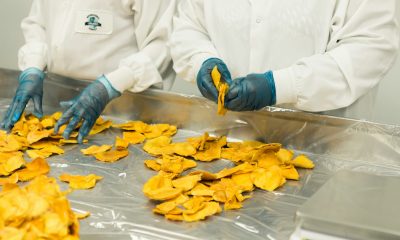Featured
How investors could help the food industry become sustainable
Food production pollutes the environment and accelerates climate change. Solving these problems requires far-reaching changes – and in the view of the experts at BNP Paribas Asset Management, it can offer investment opportunities. The coronavirus crisis accelerated the trend towards eating more plant-based foods and turning away from milk and meat consumption.

Excessive use of water and land, high greenhouse gas emissions, pesticides that enter water and soil – industrial food production pollutes the environment in many ways. For example, more and more forest is being cleared for agriculture, which leads to CO2 emissions and removes carbon stocks. Crops take the place of trees. In turn, plants are used to feed livestock, which emits climate-damaging methane gas – and not infrequently: Animal products, in particular, contribute to the food industry being responsible for 43 percent of land use and 31 percent of global greenhouse gas emissions.
Read more about the food industry and how industrial food production pollutes the environment with the Born2Invest mobile app. Our companion app brings you the latest financial news in the world.
Abuses in meat processing
In addition to the environmental aspects, food production brings social injustices and inequalities: underpaid farmers and migrant workers who work in fields, greenhouses, and slaughterhouses for a pittance and poor housing. The problems range from unequal access to affordable, sufficient, safe, and healthy food.
In addition, the Covid 19 crisis has exposed other abuses in the food industry under the table, including working conditions in slaughterhouses, meat processing plants and warehouses: The virus spread there at breakneck speed, disrupting production and causing meat shortages in supermarket freezers.
As a result, the meat processing plants had to invest massively in new air conditioning and protective equipment, for example, and change shift schedules. This highlighted the weaknesses of the industry and the risks for investors. On the other hand, this resulted in attractive investment opportunities for producers of automation equipment for the meat industry.
There is a rethink among consumers
The coronavirus pandemic has also demonstrated once again that consumers are aware of the importance of prudent consumption and how the right food contributes to health and well-being – if it has not increased this awareness. In fact, the crisis accelerated the trend towards eating more plant-based foods and turning away from milk and meat consumption.
After all, eating meat has a considerable impact on the environment: the “hoofprint” contributes to pollution and deforestation as well as to the loss of biodiversity – and accelerates climate change through the release of methane gas.
A change in diet to pulses, beans and laboratory-produced vegan meat substitutes can help reduce global warming and transform an inefficient and harmful food system. In fact, scientists warn that to keep the global temperature rise under control, people will have to eat less meat, consume less sugar, drink less milk and consume more vegetables, nuts and seeds.
More technology, less waste
Just like the switch to a healthier, plant-based diet, less food waste can reduce the negative impact on the environment. The United Nations (UN) estimates that one-third of all food produced ends up in waste or does not survive transport. This alone is responsible for eight percent of greenhouse gas emissions. The global community has therefore made the halving of food waste within ten years one of its goals for sustainable development – one of the most important initiatives in this area.
While the problems are great, the UN and governments around the world are tackling change. Business and the investment world are also involved here, as innovation and new technologies play a key role.
High-tech sensors are now being used in transportation. They monitor the temperature during transport and detect possible temperature fluctuations that can have a negative impact on the shelf life of products. In addition, block chain technology is used to track the route of products and ensure the transparency and credibility increasingly demanded by consumers.
Finally, robots and drones expand agricultural possibilities and increase efficiency, biochemistry improves crop yields, and vertical farming supplies urban areas with locally produced food.
ESG-compliant investment opportunities in the food industry
As efforts to create a more sustainable and resilient food industry continue, the issues of nutrition, food production and agriculture are increasingly attracting the attention of portfolios of investors with an appetite for ESG investments.
Many initiatives are still at the very beginning of their development and need capital to realize their potential. It is therefore important for investors to find the companies that are driving change and could shape the market in the future.
__
(Featured image by Spencer Davis via Unsplash)
DISCLAIMER: This article was written by a third party contributor and does not reflect the opinion of Born2Invest, its management, staff or its associates. Please review our disclaimer for more information.
This article may include forward-looking statements. These forward-looking statements generally are identified by the words “believe,” “project,” “estimate,” “become,” “plan,” “will,” and similar expressions. These forward-looking statements involve known and unknown risks as well as uncertainties, including those discussed in the following cautionary statements and elsewhere in this article and on this site. Although the Company may believe that its expectations are based on reasonable assumptions, the actual results that the Company may achieve may differ materially from any forward-looking statements, which reflect the opinions of the management of the Company only as of the date hereof. Additionally, please make sure to read these important disclosures.
First published in DASINVESTMENT, a third-party contributor translated and adapted the article from the original. In case of discrepancy, the original will prevail.
Although we made reasonable efforts to provide accurate translations, some parts may be incorrect. Born2Invest assumes no responsibility for errors, omissions or ambiguities in the translations provided on this website. Any person or entity relying on translated content does so at their own risk. Born2Invest is not responsible for losses caused by such reliance on the accuracy or reliability of translated information. If you wish to report an error or inaccuracy in the translation, we encourage you to contact us.

-

 Crowdfunding2 weeks ago
Crowdfunding2 weeks agoNewcleo Raises $85 Million to Advance Fourth-Generation Nuclear Reactors
-

 Markets2 days ago
Markets2 days agoMarkets, Jobs, and Precious Metals Show Volatility Amid Uncertainty
-

 Biotech1 week ago
Biotech1 week agoDNA Origami Breakthrough in HIV Vaccine Research
-

 Cannabis6 days ago
Cannabis6 days agoWhen a Cutting Becomes a Cannabis Plant: Court Clarifies Germany’s Three-Plant Rule

























